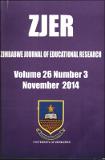| dc.contributor.author | Masengwe, Gift | |
| dc.contributor.author | Machingura, Francis | |
| dc.coverage.spatial | Zimbabwe. | en |
| dc.date.accessioned | 2016-03-14T15:56:42Z | |
| dc.date.available | 2016-03-14T15:56:42Z | |
| dc.date.issued | 2014-11 | |
| dc.identifier.citation | Masengwe, G. and Machingura, F. (2014) Challenges and opportunities of the postcolonial state university education in Africa: an appraisal of Hunhu/Ubuntu in national-moral development in Zimbabwe, Zimbabwe Journal of Educational Research, vol. 26, no.3, pp. 362-382. Harare: HRRC. | en |
| dc.identifier.issn | 1013-3445 | |
| dc.identifier.uri | https://opendocs.ids.ac.uk/opendocs/handle/20.500.12413/10036 | |
| dc.description | A research argument on the importance of morality (Ubuntu/Hunhu) on the post-colonial university graduate in order to be morally relevant to the society that he/she is to serve. | en |
| dc.description.abstract | Postcolonial state universities have continued to serve African countries in producing highly educated professionals pertinent for the national economy and development. Unfortunately the moral philosophy of education in tertiary training institutions has been unclear for its products lacked moral relevance to local needs. This failure can be attributed to universities that traditionally hold on to foreign philosophies of education not rooted in local morality. It is for this cause that this paper seeks to appraise the role of state university education in developing ethical and moral development through fostering hunhu/ubuntu philosophy. The aim of this article is to highlight the challenges and opportunities advanced by the postcolonial state university education to national-moral development in Zimbabwe. The study is mainly a review of related literature on the moral philosophy of state university education since independence in Zimbabwe. Local universities are challenged by developments in the moral climate in the country\ which demands for a major curricula review, to improve on professional moral-ethical contact in reshaping the world of the 21s' century. In order to curb the social, political and economic ills experienced in Zimbabwe, this article proposes the moral and ethical approach using hunhu/ubuntu philosophy in remedying actions that are disruptive to the common good. The study also recommends that African universities inculcate person-hood in its products using this hunhu/ubuntu philosophy. | en |
| dc.language.iso | en | en |
| dc.publisher | Human Resource Research Centre (HRRC), University of Zimbabwe (UZ) | en |
| dc.rights.uri | http://creativecommons.org/licenses/by-nc-nd/3.0/ | en |
| dc.subject | Education | en |
| dc.title | Challenges and opportunities of the postcolonial state university education in Africa: an appraisal of Hunhu/Ubuntu in national-moral development in Zimbabwe | en |
| dc.type | Article | en |
| dc.rights.holder | University of Zimbabwe (UZ) | en |


